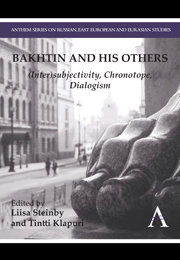Book contents
- Frontmatter
- Contents
- Acknowledgments
- Translation and Transliteration
- Introduction: The Acting Subject of Bakhtin
- Chapter 1 Bakhtin and Lukács: Subjectivity, Signifying Form and Temporality in the Novel
- Chapter 2 Bakhtin, Watt and the Early Eighteenth-Century Novel
- Chapter 3 Concepts of Novelistic Polyphony: Person-Related and Compositional-Thematic
- Chapter 4 Familiar Otherness: Peculiarities of Dialogue in Ezra Pound's Poetics of Inclusion
- Chapter 5 Author and Other in Dialogue: Bakhtinian Polyphony in the Poetry of Peter Reading
- Chapter 6 Tradition and Genre: Thomas Kyd's The Spanish Tragedy
- Chapter 7 Bakhtin's Concept of the Chronotope: The Viewpoint of an Acting Subject
- Chapter 8 The Provincial Chronotope and Modernity in Chekhov's Short Fiction
- List of Contributors
Chapter 1 - Bakhtin and Lukács: Subjectivity, Signifying Form and Temporality in the Novel
Published online by Cambridge University Press: 05 May 2013
- Frontmatter
- Contents
- Acknowledgments
- Translation and Transliteration
- Introduction: The Acting Subject of Bakhtin
- Chapter 1 Bakhtin and Lukács: Subjectivity, Signifying Form and Temporality in the Novel
- Chapter 2 Bakhtin, Watt and the Early Eighteenth-Century Novel
- Chapter 3 Concepts of Novelistic Polyphony: Person-Related and Compositional-Thematic
- Chapter 4 Familiar Otherness: Peculiarities of Dialogue in Ezra Pound's Poetics of Inclusion
- Chapter 5 Author and Other in Dialogue: Bakhtinian Polyphony in the Poetry of Peter Reading
- Chapter 6 Tradition and Genre: Thomas Kyd's The Spanish Tragedy
- Chapter 7 Bakhtin's Concept of the Chronotope: The Viewpoint of an Acting Subject
- Chapter 8 The Provincial Chronotope and Modernity in Chekhov's Short Fiction
- List of Contributors
Summary
Introduction: Bakhtin and Lukács
New research on the German and Russian background of Bakhtin's thinking, and the new perspectives and understanding thus opened up, invite an interest in contributing to this understanding by clarifying some new connection or aspect. Since Bakhtin apparently combined quite freely ideas from a great number of different authors – and notoriously even borrowed directly from their works without indicating the source (e.g. Poole 1998) – it is obvious that a great deal of work remains to be done in this area. My purpose in this chapter is to elucidate one of those connections, namely Bakhtin's debt to the young Georg Lukács, the Hungarian aesthetician and literary scholar. Lukács, who wrote in German, began as a Neo-Kantian and Hegelian, but in the 1930s became immensely influential as a Marxist literary theorist.
The basic study of Bakhtin's relation to Lukács, and of the common intellectual background they shared, is Galin Tihanov's The Master and the Slave: Lukács, Bakhtin, and the Ideas of Their Time (2000). Until the publication of Tihanov's work, the connection between Lukács and Bakhtin passed unnoticed in the Bakhtin boom that has been ongoing since the 1970s. There is a natural reason for this: in none of his published writings does Bakhtin ever mention Lukács. Tihanov, however, noticed a reference to Lukács in Bakhtin's unpublished doctoral dissertation (Tihanov 2000, 295).
- Type
- Chapter
- Information
- Bakhtin and his Others(Inter)subjectivity, Chronotope, Dialogism, pp. 1 - 18Publisher: Anthem PressPrint publication year: 2013



